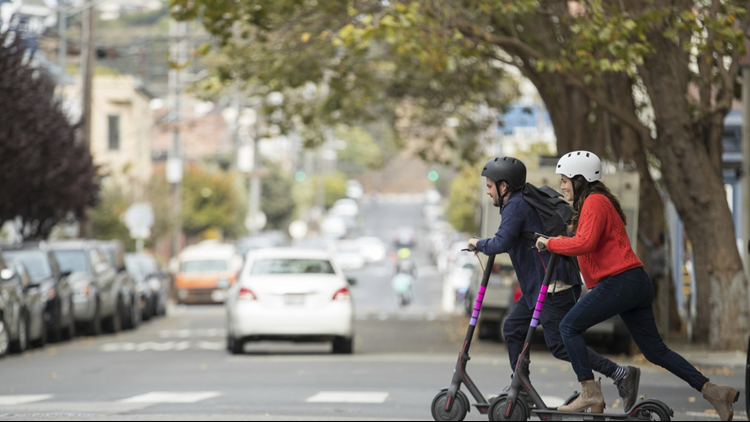WASHINGTON -- The latest company to debut electric scooters in D.C.: Lyft, which, on Thursday, unveiled a fleet of pink scooters.
As of Thursday morning, Lyft app users could access the scooters via their app. It’s $1 to unlock a scooter and 15 cents every minute after, similar to other dockless scooters.
In a statement on Thursday, Lyft said the addition of the scooters is a reflection of their philosophy which believes “that cities should be built around people, not cars,” and hopes to see less people use personal vehicles.
Chris Dattaro, the Market Manager, Lyft Bikes & Scooters in D.C., said that the District is the third market to debut the scooters and the first on the East Coast after Santa Monica and Denver.
"Cities are only so big," Dattaro said. "The only way to move around...is to either reduce the number of cars on the road...or to introduce alternative transportation."
Of course, D.C. comes with a unique set of challenges, including the easy pathways to neighboring counties in different states, like Arlington or Montgomery. Dattaro said there would be potential service fees for those who take scooters outside of city limits, but not for those who return them to D.C.
In addition to electric scooters, Lyft is also introducing a bikeshare program, although the bikes haven’t made an appearance yet in the District. Dattaro said they should come in the near future, but couldn't disclose any specific plans.
RELATED: Can I ride here? How to ride electric scooters safely in DC, Arlington Co., and Montgomery Co.
Lyft said they worked with both the city and DDOT to bring the electric scooters. Like Bird scooters, Lyft riders are required to scan their driver’s license before use and users must be 18 and older. Dattaro says this is consistent with the Lyft app which also requires you to be older than 18 to use.
Lyft isn’t the first ride-share company to join the growing bike and scooter trend. Limebike, one of the companies in D.C. which has both a fleet of electric scooters and dockless bikes, partnered with Uber earlier in 2017, which made Lime available on Uber apps.
However, Uber acquired Jump bike in April, another dockless bike company, which had already been introduced in the District. Jump is the only dockless bikeshare company to offer electric bikes, which give riders more power when riding.
Capital Bikeshare introduced out their own version of electric bikes in August with Capital Bikeshare Plus.
With Lyft’s addition to the market, it joins Jump, Lime, Spin, Skip (previously Waybot) and Bird. Jump currently only operates bikes, but has begun its own introduction of scooters in Santa Monica, only. Ofo and Mobike, two companies that launched after the initial pilot, pulled out of the city in the past few months, citing the District’s bike cap which only allows 400 vehicles per company.
The growing trend has brought some questions, in addition to excitement, to the city.
In the District, DDOT extended the bikeshare program following the completion of its pilot in August. However, new regulations require bikeshare users to now dock bikes and scooters to bike racks to avoid congestion on sidewalks and private property. Jump’s bikes already come with locks.
Furthermore, there are few regulations that prevent electric scooter riders from riding on the sidewalk, with MPD Public Affairs Specialist Brianna Jordan saying that sidewalk riders should follow the same rules that cyclists who ride on sidewalks do.
Only certain areas, which include Foggy Bottom, near the White House, and the National Mall, require users to ride in the streets. And while helmets are recommended, they’re not required for users over 16.
There are also safety concerns after a young man died while riding one in DuPont Circle when he was hit by a car.
Dattaro said Lyft is looking to address some of these concerns through education. Users must accept the terms and conditions before riding their scooters, which he says should walk them through rules and regulations. Users are also given safety pointers as they ride, such as to wear a helmet.
Some social media users said they’re more convenient and environmentally-friendly, while others argue they clog streets and their speed is a danger.



